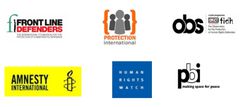JOINT STATEMENT by Frontline Defenders, Protection International, Observatory for the Protection of Human Rights Defenders (World Organisation Against Torture (OMCT) & International Federation for Human Rights (FIDH)), Amnesty International, Human Rights Watch and Peace Brigades International.
The adoption in 2012 of the European Union (EU) Strategic Framework and Action Plan on Human Rights and Democracy marked a new step in reinforcing EU and member states’ support of the work of Human Rights Defenders (HRDs) through the establishment of explicit objectives and targeted actions.
This instrument complements other policies and operational tools, such as the EU Guidelines on HRDs -the European External Action Service (EEAS) guidance note for EU Missions and local implementation strategies-, the Human Rights Country strategies, and the European Instrument for Democracy and Human Rights (EIDHR), as part of a positive approach aimed at providing “effective support to HRDs” (Action 18 of the Action Plan).
Recent Council Conclusions on the 10 th anniversary of the EU HRD Guidelines committed to:
“intensify [EU] political and material support to human rights defenders and step up its efforts against all form of reprisals, and will actively support the strengthening of UN monitoring in this regard. The EU is particularly committed to improve its support to vulnerable and marginalised human rights defenders. The EU will intensify outreach to those operating in remote and rural areas. Particular attention is paid to women human rights defenders.” (1)
Currently, Action 18 of the Action Plan encompasses three sub-action points. (*) Despite some progress, all of these action points still require full implementation by the EU and its member states. In the spirit of the recent Council Conclusions, these actions should be rolled over to the future Action Plan to ensure continuity in commitment and actions undertaken by the EU and member states as support to HRDs is intensified. In future, the EU and its member states can do more by rethinking their relations with HRDs beyond immediate measures for protection in individual cases.
The undersigned civil society organisations working closely with HRDs worldwide, call on the EU and its member states to use the revision of the Action Plan as an opportunity to be more ambitious. While we welcome the practical and measurable action points of the current Action Plan, the EU and its member states also need to adopt a more coherent and holistic approach in their relations with human rights defenders. Effective and meaningful support to HRDs by the EU and its member states should aspire to:
1. Better protect
The EU has developed a number of policies and operational tools aiming at protecting HRDs, such as the EU Guidelines on HRDs. Many of them are currently only partially implemented, notably in terms of geographical scope and beneficiaries. At the June 2014 Foreign Affairs Council, the EU and its member states renewed their commitment to the implementation of the EU Guidelines, and called for improved support to vulnerable and marginalised HRDs, women HRDs, and those working in remote regions. The EU can achieve better protection of HRDs - including better prevention of the risks associated with their work:
1. Institute a system for the centralised follow-up of all human rights defenders' cases, and their treatment by the EU and Member states at headquarters and in delegations. It should help track action taken on each case, press for action where necessary, develop strategies for addressing medium to long-term cases;
2. Ensure all staff in Delegations in diplomatic missions, and at headquarters, including at the highest level, are aware of the importance of working with and for HRDs, of the EU Guidelines and of the necessity to implement them fully, and of reporting back. Systematically train EU and member states’ staff at all levels on the full implementation of the EU HRD Guidelines;
3. Facilitate emergency measures such as relocation and emergency visas for HRDs, and ensure all staff are aware of procedures. Ensure the facilitation of visas for HRDs visiting decision-makers in the EU and member states in order to reinforce meaningful exchanges on how to support their vital work;
4. Monitor and provide systematic feedback to HRDs, civil society and the public on EU and member states’ actions on HRDs, encouraging meaningful public debate on how to reinforce their vital efforts;
5. Assist and support governments and promote participation of local civil society in developing and implementing public policies and mechanisms for the protection of HRDs; and/or in advocating for the amendment or abrogation of restrictive laws; and in the fight against impunity for human rights violations committed against HRDs;
6. Ensure that an annual Foreign Affairs Council meeting is dedicated to discussing EU efforts to pursue the release of HRD, journalists and others who exercise their rights peacefully. Foreign Ministers should adopt conclusions naming jailed rights advocates from around the world and call for their immediate and unconditional release. Every three months PSC Ambassadors should take stock, in close collaboration with civil society, of EU efforts to pursue the release of jailed HRDs. EU delegations should be requested to clarify efforts they have undertaken, ahead of these meetings;
7. In the spirit of the EU Guidelines on HRDs, the EU and its member states should commit to documenting and reporting on effective best practices in support of HRDs, and working to reproduce them where relevant in future; organise annual regional workshops with civil society to exchange best practices and lessons learned, and build the capacity of HRDs, and of senior EU and member states’ diplomatic staff.
2. Reach out
While aiming at better protection of HRDs, EU policies in support of HRDs must also go beyond addressing their protection in emergency situations on an ad hoc basis. This means considering HRDs not only as victims of repression, but as key actors of change in their own country who can likewise provide a valuable contribution to the design of both EU and national policies and decision-making. EU support to HRDs should take their point of view into consideration in the preparation of EU policies and action. It should also aim to ensure that any EU or member state action, be it in trade or development, protects and promotes human rights;
8. Implement burden-sharing between the EU and Member states, to ensure that human rights defenders in all regions of a country have access to, and contact with, the EU; that the responsibility for particularly logistically challenging tasks such as trial observation, prison visits or contacts with rural areas does not fall only on one diplomatic mission, and that continued buy-in on human rights issues by all is possible;
9. Actively support HRDs through a flexible combination of concrete actions and public diplomacy, on the basis of effective consultation with concerned HRDs, including public intervention whenever this can improve the security of HRDs at risk;
10. Conduct regular visits to HRDs outside large urban centres, and increase outreach to vulnerable, marginalised HRDs and women HRDs;
11. Clearly communicate the human rights priorities of EU country strategies to local HRDs to facilitate their work. In line with commitments under the 2012 Action Plan, the EU and its member states must guarantee that contact information for EU and member states’ focal points on human rights and HRDs are publicly available and accessible to all HRDs and civil society;
12. Systematically include meetings with HRDs when planning high level visits to third countries (including visits by member states’ representatives and Members of the European Parliament);
13. Translate the Guidelines on HRDs into local languages, and disseminate them amongst civil society, including different ethnic minority groups and indigenous communities.
3. Do no harm
The EU and its member states should evaluate all actions taken in regard to their compliance with human rights, and concretely monitor trade and development policies and programming to ensure they are consistent with EU and member states’ human rights commitments. The EU should offer HRDs recourse in case their human rights or those of the people they defend are violated. The 'do no harm' principle should be integrated in other actions foreseen in the revised Strategic Framework and Action Plan (under 'trade', 'development' etc...), which is why only key actions are proposed here:
14. Ensure the meaningful consultation/participation of HRDs, possibly through the development of a specific format for regular exchanges, in the preparation of EU and member states’ human rights dialogues, strategies, development programming, and in the context of EU trade and investment policy;
15. When debating national policy with third country governments, the EU should strive to facilitate dialogue between governments and HRDs (for example on security, development, health, etc), and ensure inclusion of HRDs and social organisations in decision-making on these issues;
16. Set up a complaint mechanism for HRDs who have become victims of human rights violations in the context of EU and member states’ policies and investments.
We welcome your engagement to support human rights defenders worldwide and look forward to continuing our positive dialogue to ensure EU and member state action to promote and protect their vital work.
(*) (a) Develop and implement a voluntary initiative to facilitate the provision of temporary shelter to human rights defenders at risk.
(b) Promote improved access by human rights defenders to the UN and regional human rights protection mechanisms, and address the issue of reprisals against defenders engaging with those mechanisms.
(c) Publish contact details of the human rights focal points of all EU missions, as well as EU Liaison Officers on human rights defenders on the websites of the EEAS and EU Delegations

